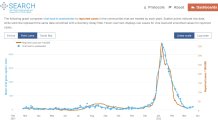San Diego researchers have been keeping track of possible upcoming COVID-19 waves by tracking the viral load found in wastewater. The latest findings show a slight uptick which could lead to an increase of confirmed coronavirus cases.
While COVID-19 cases are substantially lower than what San Diego experienced in January during the height of the Omicron surge, last December wastewater samples collected at the Point Loma treatment plant and studied by UC San Diego researchers caught the start of the Omicron wave and the end.
Doctors explain how when we see a rise in the stool viral load about one to two weeks later we see the number of confirmed COVID-19 cases go up.
Get San Diego local news, weather forecasts, sports and lifestyle stories to your inbox. Sign up for NBC San Diego newsletters.
Latest numbers from Monday show how 2.1 million viruses per liter were detected, that is nearly double the previous week’s findings.

Despite the highly contagious new omicron subvariant, health leaders are staying optimistic.
Local
“I am concerned that there may be more cases coming up, but what I'm reassured about is that if this is a BA.2 variant and if this is more mild then we should not see the impact in terms of people getting really sick from this or having severe disease,” explained Dr. William Tseng, Kaiser Permanente Assistant Chief of staff.
San Diego County has confirmed 140 BA.2 cases. Researchers believe it's critical for them to monitor new variants and study their impacts so the community can be prepared for future surges.



